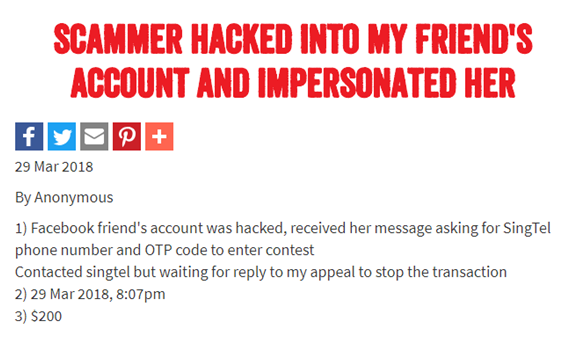FACEBOOK IMPERSONATION SCAM
Facebook is the most popular social network worldwide. People use Facebook on a daily basis to keep in touch with their family, friends, and acquaintances. Facebook is rated as the best social media platform where one can share pictures, videos, and a lot of other interactive content. These days, you will see that Facebook is also used as a medium to promote businesses and services. People create Facebook accounts as well as Facebook pages in order to enhance their digital presence. Facebook has become a medium for social media optimization, social media marketing, and digital marketing. Hence, Facebook is something massive, where you will find a large group of people to connect with such a huge network of users, it has also become a prime target for scammers looking for potential victims. It becomes really easy for these fraudsters to find links and connections through this social media platform.
Facebook, the globally renowned social network, has revolutionized the way people connect and share information online. Founded by Mark Zuckerberg in 2004, it quickly gained immense popularity and has since become one of the most visited websites in the world. Facebook allows users to create personal profiles, connect with friends, family, and acquaintances, and share various forms of content, including text posts, photos, and videos. Its user-friendly interface and extensive features have made it a versatile platform for personal communication, professional networking, and even business marketing. Facebook’s introduction of features like the News Feed, Groups, and Pages has further enriched the user experience. However, the platform has also faced scrutiny over privacy concerns and issues related to misinformation. Despite this, Facebook remains an influential force in the realm of social media, with billions of active users worldwide, making it a cornerstone of online social interaction in the 21st century.

FACEBOOK SCAMS - TAKE A LOOK :
Facebook hacking scams, Facebook fake profile scams, and other forms of cheating via Facebook are not new in the scammer industry. What is new and increasingly popular among Facebook scams is the Facebook impersonation scam. In a Facebook impersonation scam, the scammers literally hijack the victim’s profile at first and then try different ways to make money by approaching various people for different reasons. The receiving victim is, in most cases, unaware that the profile has been hijacked—unless and until the real owner of the profile realizes it and communicates the news to others via some source. As a result, people believe the request is from their actual friend and easily agree to whatever the scammer has asked for. It is only later that they realize it was a case of Facebook impersonation.
In a Facebook impersonation scam, a fraudster creates a fake profile—often using the name and images of a real person—to deceive others. The scammer typically sends friend requests or messages to the victim's contacts, pretending to be the genuine account holder. Once accepted, they may engage in various deceptive activities. This can include soliciting money or personal information under false pretenses, spreading misinformation, or even damaging the victim’s reputation. In some cases, these scams aim to exploit personal relationships, leading to emotional manipulation or financial loss. It's important to be vigilant and verify the authenticity of friend requests or messages, especially if they seem out of character. Reporting impersonation scams to Facebook and educating others about these tactics is crucial in preventing further victimization. Staying cautious and skeptical of unfamiliar online interactions can help protect you from falling prey to such deceptive schemes.

WHAT HAPPENS IN A FACEBOOK IMPERSONATION SCAM ?

TIPS AND TACTICS TO AVOID FACEBOOK IMPERSONATION SCAM :
It is highly important to practice caution and adhere to certain rules of thumb to avoid Facebook impersonation scams. Below are some basic security tips that will help you stay away from Facebook scams:
? Do not use simple passwords. Scammers are highly skilled and can easily crack weak passwords to hijack your Facebook account.
? Do not use the same password for all your accounts. Many users have the habit of using identical passwords everywhere. If a scammer gains access to your Facebook password, you risk losing access to all other linked accounts and associated valuables.
? Never accept friend requests from completely unknown accounts. It might be a scammer’s tactic to scan and screen your profile before launching a hijack attempt.
? Facebook has incorporated many security measures for its users. Make sure to enable features like two-factor authentication, which adds an extra layer of protection to your account.
? Avoid connecting to free Wi-Fi networks or other public networks that offer data access. Scammers can intercept your credentials through these unsecured connections.
? Familiarize yourself with Facebook’s security features to ensure your account is as secure as possible.
To steer clear of Facebook impersonation scams, it's essential to be vigilant and employ precautionary measures. Firstly, regularly review your friend requests and only accept requests from individuals you know personally. Scrutinize profiles for suspicious signs, such as limited activity or scant personal information. Secondly, enable privacy settings that restrict who can send you friend requests and messages. This adds an extra layer of protection against potential scammers. Thirdly, if you receive a friend request from someone you're already connected with, double-check with the actual person through a trusted communication channel before accepting. Be cautious of unsolicited messages asking for personal information or financial assistance. Report any suspicious accounts to Facebook promptly. Lastly, educate yourself and others about the tactics used in impersonation scams to increase awareness and prevention. By implementing these tactics and staying vigilant, you can significantly reduce the risk of falling victim to Facebook impersonation scams.

EXAMPLES OF FACEBOOK IMPERSONATION SCAM :
Example 1 :-

Example 2 :-

Example 3 :-

The above is another example of a Facebook impersonation scam, where the victim's friend loses money to the scammer.
In a Facebook impersonation scam, many victims fall prey to fraudulent activities. It is not only the profile owner whose account gets hacked, but all the friends listed in the hacked Facebook profile are equally at risk of being scammed.
Feel Free to use our Spam Checker Tool
We are providing the Spam Checker Tool for your convenience. Here, you can enter the email or contact number that you suspect to be a scam. This tool checks it against our spam database and informs you whether the email or phone number is genuine or bogus.
Report scams to the United States government — you can file a complaint about a scam or other crime here.




